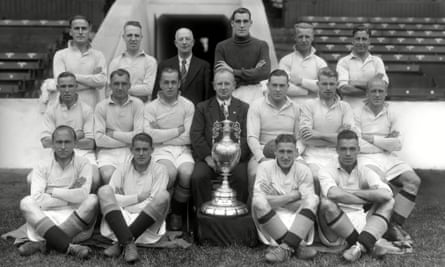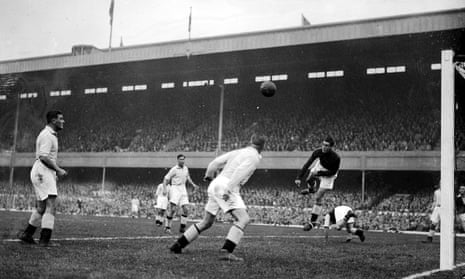Even after the remarkable draw with Stoke City, and the victory over Manchester City, Leicester City stand only three points above the relegation zone. The possibility they could be relegated as champions is a very real threat. They would not be the first title-winners to go down the following season: that honour belongs to – who else? – Manchester City.
Their title, like Leicester’s, had come as something of a surprise. They had finished ninth in 1935-36 and unsettled by injuries to the captain, Sam Barkas, the centre-forward Fred Tilson and the inside-forward Alec Herd, they began 1936-37 badly, winning only three of their first 13 games, so that by the end of October they were 16th. Their form picked up in early winter but a 5-3 defeat by Grimsby Town on Christmas Day – the second successive game in which they had leaked five, left them 12th.
That, though, was a gifted side and the man in charge, Wilf Wild, remains both the longest-serving manager in City’s history and the most successful after Joe Mercer. Barkas was a tough-tackling left-back who modelled his game on the great Sunderland and Everton defender Warney Cresswell, the “prince of full-backs” who had also been born in South Shields. Herd, the father of David Herd, who won two league titles with Manchester United (they played together for Stockport County on the final day of the 1950-51 season), was a hard-running inside-forward with a powerful shot.
There was the imaginative Northern Irish inside-forward Peter Doherty, who would score 30 goals that season, and a pair of England wingers in Ernie Toseland and Eric Brook. And there was also the highly promising young goalkeeper Frank Swift, who would win England caps after the war before becoming a journalist, in which capacity he was working when he was killed in the Munich air disaster.
A 2-1 win over Middlesbrough on Boxing Day turned the season round. Flurries of goals were a feature: a 6-2 win over West Bromwich Albion in which all the goals came in the first half; four goals in seven minutes as they put five past Liverpool on Easter Monday; three in quick succession as they came from 1-0 down at Sunderland with 22 minutes remaining to win 3-1; three in three minutes as they overhauled a 2-0 deficit to win 5-2 in the mud at Preston. They went unbeaten through the final 22 games of the season, wrapping up their first top-flight title on the penultimate weekend by beating Sheffield Wednesday 4-1.
City maintained their unbeaten run in fortunate circumstances on the last day of the season against Birmingham City: 2-1 down with a minute remaining, Doherty chased a ball over the top and collided with the goalkeeper Harry Hibbs, punching the ball into the net in the confusion and being left startled – he said in his autobiography – when nobody even protested. Payback would come a year later.
City celebrated the title by going on a three-week tour of Germany, where they became the first British side to play in the new Olympiastadion in Berlin, going down 3-2 to a Germany Select XI, their first defeat since the game against Grimsby on Christmas Day.
Once the bubble burst, though, it went down in a rush. City lost to Wolves on the opening day on 1937-38 and although they then beat Everton and Leicester at home, they immediately lost to Everton and Sunderland away. They remained inconsistent but when City beat Grimsby 3-1 on 27 November it ensured they began December in a higher league position than they had the previous season.

However, the defeats stacked up: four in a row over Christmas, although that run was followed by a 4-1 win over Leicester and a 7-1 win over Derby. That was the pattern for the rest of the season: when they beat a side they tended to hammer them but there were far too many defeats. They went eight games without a win but later smashed West Bromwich 7-1. On the penultimate weekend, City won 6-2 at Leeds United to climb to 16th in a 22-team league, with only two to go down.
“City’s big win over Leeds United – and not so much the number of goals as the signs of rejuvenation among the players – makes it a probability that they will retain membership of the First Division,” wrote The Captain in his Sporting Gossip column in the Manchester Evening News. But it was impossibly tight: City went into the final game, at Huddersfield Town, as one of seven sides who could go down.
They lost 1-0, with Doherty claiming a 35-yard Herd shot, rather than striking the bar as the referee insisted, had hit the stanchion inside the net and then bounced out. Two successive final days: one goal given that should not have been to preserve a meaningless unbeaten record, one goal not given that perhaps should have been that led to a defeat and relegation.
City finished as the top scorers in the division and with a positive goal difference: it was a very City way to go down. “Most of the players were the same in each of the two campaigns,” Swift said, “but some of them were growing old together. I really believe that we played ourselves out when winning the title the previous season and the following term things just did not go the way we felt they should.”
No one had coined the term “City-itis” then but as various writers scrabbled for explanations they were clearly grasping for it. This was, essentially, inexplicable. In the Observer, JT Bolton described their downfall as “staggering” without offering any solid theories. The Times’s unnamed correspondent, meanwhile, summed up the club’s entire history in one line. “Manchester City,” he wrote, “are a fantastically eccentric side.”

Comments (…)
Sign in or create your Guardian account to join the discussion